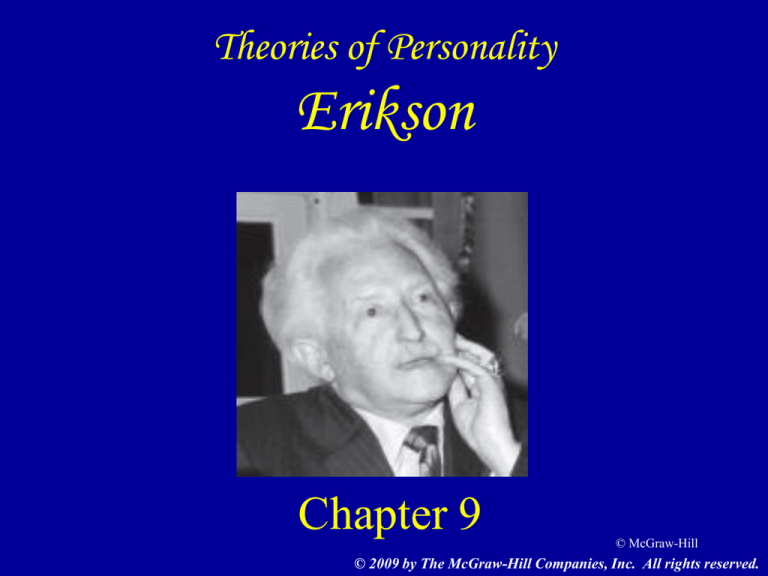
Theories of Personality
Erikson
Chapter 9
© McGraw-Hill
© 2009 by The McGraw-Hill Companies, Inc. All rights reserved.
Outline
•
•
•
•
•
•
•
•
Overview of Post-Freudian Theory
Biography of Erickson
The Ego in Post-Freudian Theory
Stages of Psychosocial Development
Erickson’s Method of Investigation
Related Research
Critique of Erickson
Concept of Humanity
© McGraw-Hill
Overview of Post-Freudian Theory
• Intended to Extend Freud’s Assumptions
–
–
–
–
Including extending infantile development
Life-cycle approach to personality
Emphasis on social and historical influences
Stages of development are characterized by a
psychosocial struggle
• For example, identity crisis
© McGraw-Hill
Biography of Erickson
• Born in Frankfurt, Germany in 1902
• Son of Jewish mother and unknown father
• As a child, does not feel accepted by either
Jewish or Gentile community
• Leaves home at 18 to live as itinerant artist,
wandering Europe for 7 years
© McGraw-Hill
Biography (cont’d)
• In Vienna, is introduced to psychoanalysis by
Anna Freud, who becomes his analyst
• Graduates from Vienna Psychoanalytic Institute
• Lacking an academic degree, accepts research
position at Harvard Medical School in 1933
• Publishes Childhood and Society in 1950
• Also taught at Yale, Berkeley, and several other
institutions
• Professor of Human Development at Harvard in
1960
• Died in Cape Cod in 1994
© McGraw-Hill
The Ego in Post-Freudian Theory
•
Description of Ego Psychology
–
Three Interrelated Aspects of the Ego:
1.
2.
3.
•
Society’s Influence
–
•
Body ego
Ego ideal
Ego Identity
Ego emerges from and is largely shaped by culture
Epigenetic Principle
–
The ego grows as our organs do; developing
sequentially, with certain changes arising at a
particular time and with more recent developments
built upon previous structures
© McGraw-Hill
Stages of Psychosocial Development
• Basic Points of Stage Approach
–
–
–
–
Growth follows epigenetic principle
Every stage has an interaction of opposites
Conflict produces ego strength
Too little strength at one stage results in core
psychopathology at a later stage
– Stages are also biological in nature
– Earlier stages do not cause later personality
development
– From adolescence on, personality development
involves identity crisis
© McGraw-Hill
Stages of Psychosocial Development
(cont’d)
• Infancy
– Oral-Sensory Mode
– Modes of Incorporation
• Receiving and Accepting
– Basic Trust versus Basic Mistrust
– Hope: The Basic Strength of Infancy
• Early Childhood
– Anal-Urethral-Muscular Mode
– Autonomy versus Shame and Doubt
– Will: The Basic Strength of Childhood
© McGraw-Hill
Stages of Psychosocial Development
(cont’d)
• Play Age
– Genital-Locomotor Mode
– Initiative versus Guilt
– Purpose: The Basic Strength of the Play Age
• School Age
– Latency
– Industry versus Inferiority
– Competence: The Basic Strength of the School
Age
© McGraw-Hill
Stages of Psychosocial Development
(cont’d)
• Adolescence
– Puberty
– Identity versus Identity Confusion
– Fidelity: The Basic Strength of Adolescence
• Young Adulthood
– Genitality
– Intimacy versus Isolation
– Love: The Basic Strength of Young Adulthood
© McGraw-Hill
Stages of Psychosocial Development
(cont’d)
• Adulthood
– Procreativity
– Generativity versus Stagnation
– Care: The Basic Strength of Adulthood
• Old Age
– Generalized Sensuality
– Integrity versus Despair
– Wisdom: The Basic Strength of Old Age
© McGraw-Hill
Erickson’s Method of Investigation
• Anthropological Studies
– To show that early childhood training was
consistent with this strong cultural value
– Sioux Nation of South Dakota
– Yurok Nation of northern California
• Psychohistory
– Combination of the methods of psychoanalysis
and historical research to study personality
• Including Martin Luther and Gandhi
© McGraw-Hill
Related Research
• Generativity and Parenting
– Bauer and McAdams (2004)
– Peterson (2009)
• Having a sense of generativity is important to
effective parenting
• Generativity vs. Stagnation
– van Hiel et al. (2009)
• Generativity and stagnation can and sometimes do
operate separately and independently in adult
development
© McGraw-Hill
Critique of Erickson
• Erickson’s Theory Is:
– High on Generating Research, and
Internal Consistency
– Moderate on Organizing Knowledge,
Falsifiability, Guiding Action, and
Parsimony
© McGraw-Hill
Concept of Humanity
•
•
•
•
Determinism over Free Choice
Optimism over Pessimism
Causality over Teleology
Unconscious and Conscious Is Influenced
by Stage with Unconscious Dominating
Early Life and Conscious Later
• Culture over Biology
• Uniqueness over Similarity
© McGraw-Hill






